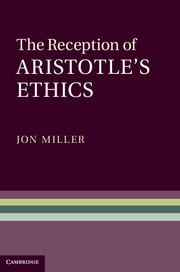Book contents
- The Reception of Aristotle's Ethics
- Contents
- Notes on contributors
- Acknowledgments
- A note on abbreviations and transliteration
- Introduction
- Chapter 1 The Nicomachean Ethics in Hellenistic philosophy
- Chapter 2 The transformation of Aristotle's ethics in Roman philosophy
- Chapter 3 Aristotelian ethics in Plotinus
- Chapter 4 St. Augustine's appropriation and transformation of Aristotelian eudaimonia
- Chapter 5 The Arabic and Islamic reception of the Nicomachean Ethics
- Chapter 6 Maimonides’ appropriation of Aristotle's ethics
- Chapter 7 The relation of prudence and synderesis to happiness in the medieval commentaries on Aristotle's ethics
- Chapter 8 Using Seneca to read Aristotle
- Chapter 9 Aristotle's Ethics in the Renaissance
- Chapter 10 The end of ends? Aristotelian themes in early modern ethics
- Chapter 11 Affective conflict and virtue
- Chapter 12 Kant and Aristotle on ethics
- Chapter 13 The fall and rise of Aristotelian ethics in Anglo-American moral philosophy
- Bibliography
- Index
Chapter 3 - Aristotelian ethics in Plotinus
Published online by Cambridge University Press: 05 February 2013
- The Reception of Aristotle's Ethics
- Contents
- Notes on contributors
- Acknowledgments
- A note on abbreviations and transliteration
- Introduction
- Chapter 1 The Nicomachean Ethics in Hellenistic philosophy
- Chapter 2 The transformation of Aristotle's ethics in Roman philosophy
- Chapter 3 Aristotelian ethics in Plotinus
- Chapter 4 St. Augustine's appropriation and transformation of Aristotelian eudaimonia
- Chapter 5 The Arabic and Islamic reception of the Nicomachean Ethics
- Chapter 6 Maimonides’ appropriation of Aristotle's ethics
- Chapter 7 The relation of prudence and synderesis to happiness in the medieval commentaries on Aristotle's ethics
- Chapter 8 Using Seneca to read Aristotle
- Chapter 9 Aristotle's Ethics in the Renaissance
- Chapter 10 The end of ends? Aristotelian themes in early modern ethics
- Chapter 11 Affective conflict and virtue
- Chapter 12 Kant and Aristotle on ethics
- Chapter 13 The fall and rise of Aristotelian ethics in Anglo-American moral philosophy
- Bibliography
- Index
Summary
In his Life of Plotinus (14, 4–14), Plotinus’ pupil Porphyry lists the authors whom Plotinus read in the philosophical group gathered around him in Rome between ad 245 and 269. This list includes various Platonist and Aristotelian commentators of the Roman imperial period (the Aristotelians Aspasius, Alexander of Aphrodisias, and Adrastus are named). Porphyry also claims that much Stoic and Aristotelian doctrine is hidden in the works of Plotinus, in particular Aristotle's Metaphysics. Such information might lead us to infer that other works of Aristotle, besides the Metaphysics, were read in Plotinus’ school, including the Nicomachean Ethics (N.E.), and that, since both Aspasius and Alexander had commented on this work of Aristotle, perhaps their commentaries on it were also known to Plotinus. We also know that Porphyry himself had commented on a work on Aristotelian ethics, perhaps the N.E. But can we be sure that these inferences are reliable?
If we use the list of references to Aristotle's N.E. given in Henry and Schwyzer's critical edition of Plotinus’ Enneads, we find, in checking the corresponding passages in Plotinus’ text, that the editors appear to identify some of these passages as quotations taken from the N.E. and others as containing ideas already to be found in Aristotle's text. This would seem to be good evidence that Plotinus read and discussed the N.E. in the meetings of his school. However, on closer inspection, one might wonder. As an example, we might take what is printed by Henry and Schwyzer as a quotation from the beginning of N.E. (1.1, 1094a2–3) in Plotinus’ Ennead 1.7, 1, 22: “for so the statement is true that it is that ‘to which everything aspires.’” Plotinus cites this statement as confirming the argument which precedes it and which seeks to establish an absolute metaphysical Good transcending all being. The statement is also cited by Aristotle at the beginning of the N.E. as confirmed by the way in which all (human) art, action, and choice are directed to some good. The statement is thus quoted, both by Aristotle and by Plotinus, in support of two very different positions, one concerning the human good, the other a metaphysical absolute Good. It is probably but not necessarily the case that Plotinus read this statement in N.E.; he could also have found it in some intermediary source, for example in Alexander of Aphrodisias.
- Type
- Chapter
- Information
- The Reception of Aristotle's Ethics , pp. 53 - 66Publisher: Cambridge University PressPrint publication year: 2012
- 5
- Cited by

